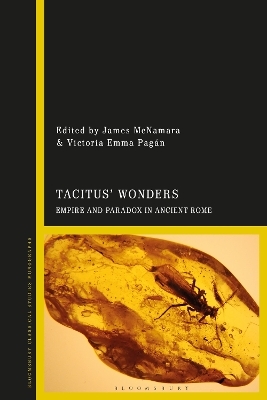
Tacitus’ Wonders
Bloomsbury Academic (Verlag)
978-1-350-24173-2 (ISBN)
Scholarship on Tacitus has to date remained largely marked by a divide between the search for veracity – as validated by modern historiographical standards – and literary approaches, and as a result wonders have either been ignored as unfit for an account of history or have been deprived of their force by being interpreted as valid only within the text. While the modern ideal of historiographical objectivity tends to result in striving for consistent heuristic and methodological frameworks, works as varied as Tacitus’ Histories, Annals and opera minora can hardly be prefaced with a statement of methodology broad enough to escape misrepresenting their diversity. In our age of specialization a streamlined methodological framework is a virtue, but it should not be assumed that Tacitus had similar priorities, and indeed the Histories and Annals deserve to be approached with openness towards the variety of perspectives that a tradition as rich as Latin historiographical prose can include within its scope. This collection proposes ways to reconcile the divide between history and historiography by exploring contestable moments in the text that challenge readers to judge and interpret for themselves, with individual chapters drawing on a range of interpretive approaches that mirror the wealth of authorial and reader-specific responses in play.
James McNamara is a DAAD-Prime Postdoctoral Research Fellow at the University of Potsdam, Germany. Victoria Emma Pagán is Professor of Classics at the University of Florida, USA.
Notes on Contributors
List of Abbreviations
Introduction (James McNamara, University of Potsdam, Germany and Victoria Emma Pagán, University of Florida, USA)
Part 1: Tacitus and Paradoxography
1. Tacitus and Paradoxography (Kelly Shannon-Henderson, University of Alabama, USA)
2. Beyond Ira and Studium: Tacitus and the Hellenistic Anxiety about Wonder (Rik Peters, University of Chicago, USA)
3. Wonderment in Aper’s Second Speech in Tacitus’ Dialogus de Oratoribus (Art Pomeroy, Victoria University of Wellington, New Zealand )
4. Laus eloquentiae and fama rerum: The paradox of the socially marvellous in Tacitus’ Dialogus and Agricola
(Brandon Jones, Boston University, USA)
Part 2: Interpreting Wonders
5. Marvellous Predictions: Wonders as Metahistory in Annals 6 (George Baroud, Emerson College, USA)
6. Prodigiosum Dictu: Interpreting Signs and Oracles in Tacitus’ Histories (Callum Aldiss, Victoria University of Wellington, New Zealand)
7. Interpreting wonders in the Agricola and Germania (James McNamara, University of Potsdam, Germany)
Part 3: The Principate as Object of Wonder
8. qualem diem Tiberius induisset: Tiberius’ Absences on Capri as an Inspiration for onder and Uncertainty (Panayiotis Christoforou, University of Oxford, UK)
9. Tacitus’ Tragic Touch: Vespasian’ Healing Miracles at Histories 4.81-3 (Holly Haynes, The College of New Jersey, USA)
10. Tacitus’ Ordinary Wonders (Victoria Emma Pagán, University of Florida, USA)
Index
| Erscheinungsdatum | 13.04.2023 |
|---|---|
| Verlagsort | London |
| Sprache | englisch |
| Maße | 156 x 234 mm |
| Themenwelt | Literatur ► Klassiker / Moderne Klassiker |
| Geschichte ► Allgemeine Geschichte ► Vor- und Frühgeschichte | |
| Geisteswissenschaften ► Sprach- / Literaturwissenschaft ► Anglistik / Amerikanistik | |
| Geisteswissenschaften ► Sprach- / Literaturwissenschaft ► Literaturwissenschaft | |
| ISBN-10 | 1-350-24173-3 / 1350241733 |
| ISBN-13 | 978-1-350-24173-2 / 9781350241732 |
| Zustand | Neuware |
| Informationen gemäß Produktsicherheitsverordnung (GPSR) | |
| Haben Sie eine Frage zum Produkt? |
aus dem Bereich


